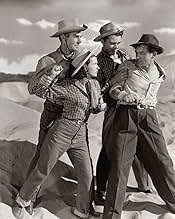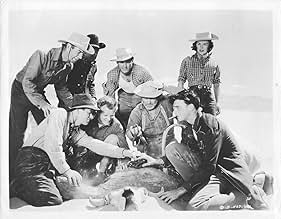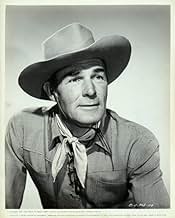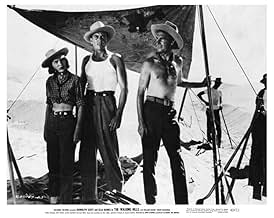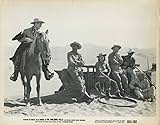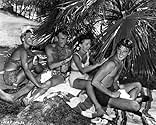IMDb RATING
6.5/10
1.2K
YOUR RATING
A group of treasure hunters search for a wagon load of gold, buried years before in Death Valley.A group of treasure hunters search for a wagon load of gold, buried years before in Death Valley.A group of treasure hunters search for a wagon load of gold, buried years before in Death Valley.
Ralph Dunn
- Detective
- (uncredited)
Ray Jones
- Rodeo Spectator
- (uncredited)
John McKee
- Bronc Handler
- (uncredited)
Frank Merlo
- Bronc Handler
- (uncredited)
Jack Parker
- American Customs Guard
- (uncredited)
Charles Stevens
- Cleve
- (uncredited)
Frank Yaconelli
- Bartender
- (uncredited)
- Director
- Writers
- All cast & crew
- Production, box office & more at IMDbPro
6.51.2K
1
2
3
4
5
6
7
8
9
10
Featured reviews
Is there gold in those hills?
Since 1945 when Randolph Scott decided to concentrate almost exclusively on westerns only one of his westerns was set in the modern west and that is this one, The Walking Hills. Shot on location the film holds it own with such gold hunting classics as The Treasure Of The Sierra Madre and Lust For Gold.
Sitting around a poker table one night Edgar Buchanan starts recounting a tale in which a wagon train loaded with sacks of gold dust got lost in the desert in the great Southwest. They're quite an assortment of characters in the place, they include at least one private detective in John Ireland and he's after one of the people in the room. But more than one of them has a reason to fear the law.
So all that were in that small barroom set out to the desert fueled by another story that Jerome Courtland tells about coming across an old wagon wheel that would have been contemporary with that gold train. Quite an assortment go besides those in the cast I've already mentioned the guys include William Bishop, Arthur Kennedy, Joe White, Russell Collins and Charles Stevens. Bishop adds an additional plot component, not only is he a suspect, but he's wooing Ella Raines who used to go out with Scott. As for Scott he's concerned with a mare in foal and he brings her along as well. Later on Ella Raines declares herself in on the gold hunt.
Although with a lot more cast members out in the desert some people's true nature starts to surface. Quite a few of the cast meets their doom. As for the gold, just about the same ironical ending as in The Treasure Of The Sierra Madre.
In a book on the Films of Randolph Scott there's a story told about Ella Raines's husband Ransom Olds who was an air ace from the recent war and would be one again in Korea and Vietnam. It seems as though for a joke he buzzed the company on location. He thought it was funny, but the roaring jet passing over frightened all the horses and the wranglers spent the rest of the day rounding them up. Ella was not amused either, nor I'm sure was Harry Cohn.
Not as good as Lust For Gold or The Treasure Of The Sierra Madre, The Walking Hills still holds its own with the others and holds up well for today's audience. Greed is a timeless and universal theme.
Sitting around a poker table one night Edgar Buchanan starts recounting a tale in which a wagon train loaded with sacks of gold dust got lost in the desert in the great Southwest. They're quite an assortment of characters in the place, they include at least one private detective in John Ireland and he's after one of the people in the room. But more than one of them has a reason to fear the law.
So all that were in that small barroom set out to the desert fueled by another story that Jerome Courtland tells about coming across an old wagon wheel that would have been contemporary with that gold train. Quite an assortment go besides those in the cast I've already mentioned the guys include William Bishop, Arthur Kennedy, Joe White, Russell Collins and Charles Stevens. Bishop adds an additional plot component, not only is he a suspect, but he's wooing Ella Raines who used to go out with Scott. As for Scott he's concerned with a mare in foal and he brings her along as well. Later on Ella Raines declares herself in on the gold hunt.
Although with a lot more cast members out in the desert some people's true nature starts to surface. Quite a few of the cast meets their doom. As for the gold, just about the same ironical ending as in The Treasure Of The Sierra Madre.
In a book on the Films of Randolph Scott there's a story told about Ella Raines's husband Ransom Olds who was an air ace from the recent war and would be one again in Korea and Vietnam. It seems as though for a joke he buzzed the company on location. He thought it was funny, but the roaring jet passing over frightened all the horses and the wranglers spent the rest of the day rounding them up. Ella was not amused either, nor I'm sure was Harry Cohn.
Not as good as Lust For Gold or The Treasure Of The Sierra Madre, The Walking Hills still holds its own with the others and holds up well for today's audience. Greed is a timeless and universal theme.
Terrific little treasure hunt movie
John Sturges, later to direct The Magnificent Seven and Bad Day at Black Rock, does extremely well with this little sleeper about modern day westerners hunting for a lost gold caravan in the California desert. William Bishop isn't bad as the honest murder fugitive, and John Ireland and Arthur Kennedy are strong as usual as a couple of not-very-ethical types. Randolph Scott gets to play some interesting notes here as a horse rancher caught up in the hunt, and the supporting parts are all well played. The sandstorm in the last act is really terrifically exciting, and speaking as one who's filmed during a sandstorm, it's hard to believe the stars put up with filming such a long sequence in those conditions. My hat's off to them and to Sturges for a fine little movie, written by Alan Le May (of The Searchers and The Unforgiven fame).
A treasure hunt that's a gem itself
A very rewarding "lust for gold" adventure that tells its story in a brief 78 minutes and is all the better for it. Director John Sturges would later in his career allow some of his films to run overlong (THE GREAT ESCAPE) or blow up what should have been more simply told (GUNFIGHT AT THE OK CORRAL - the depicted gunfight itself is but one example), but earlier in his career made a number of lean, taut treasures, this is one of them.
A group of people are bound together in the search for some wagons believed to have been lost in the desert a century earlier, and the legend has it that gold was on them. When the youngest of them happens to mention something spotted in the desert, the need for secrecy binds the group together lest someone reveal the "golden opportunity." Several in the group have pasts that they are trying to hide and potential futures they are trying to escape if caught. One of them is a detective hot on a fugitive's trail, but willing to set aside duty for his share of the loot.
Randolph Scott headlines as the more or less moral center of the group, even if his intentions and actions seem to defy that description. For a slightly less than "A" feature, the film boasts an admirable cast of characters, among them Ella Raines, John Ireland, Arthur Kennedy, Edgar Buchanan (scene stealing as usual) and blues/folk revivalist singer Josh White whose musical contributions to the film capture a legendary performer for posterity. William Bishop, a young man whom Columbia was grooming for stardom (but who failed to click and would soon "descend" to mostly TV work) is the least familiar perhaps of the major actors, but he's impressive enough here for one to wish he had done better within the ten years that he had left before cancer took him at 41.
An interesting subplot has Scott's mare about to foal - a metaphor for new life or spiritual rebirth being created among the desert ruins. It gives nothing away to reveal that the fugitive surrenders or that some characters realize that gold fever can cause one to suspend principles - the latter is expected in such melodramas. But with its stunning black-and-white cinematography, especially in night scenes and the climatic desert storm, this film is as much of a treasure as that which its protagonists seek. Camera ace Charles Lawton must have impressed Scott and producer Harry Joe Brown as he would do five more films with the pair in the next decade. Highly recommended.
A group of people are bound together in the search for some wagons believed to have been lost in the desert a century earlier, and the legend has it that gold was on them. When the youngest of them happens to mention something spotted in the desert, the need for secrecy binds the group together lest someone reveal the "golden opportunity." Several in the group have pasts that they are trying to hide and potential futures they are trying to escape if caught. One of them is a detective hot on a fugitive's trail, but willing to set aside duty for his share of the loot.
Randolph Scott headlines as the more or less moral center of the group, even if his intentions and actions seem to defy that description. For a slightly less than "A" feature, the film boasts an admirable cast of characters, among them Ella Raines, John Ireland, Arthur Kennedy, Edgar Buchanan (scene stealing as usual) and blues/folk revivalist singer Josh White whose musical contributions to the film capture a legendary performer for posterity. William Bishop, a young man whom Columbia was grooming for stardom (but who failed to click and would soon "descend" to mostly TV work) is the least familiar perhaps of the major actors, but he's impressive enough here for one to wish he had done better within the ten years that he had left before cancer took him at 41.
An interesting subplot has Scott's mare about to foal - a metaphor for new life or spiritual rebirth being created among the desert ruins. It gives nothing away to reveal that the fugitive surrenders or that some characters realize that gold fever can cause one to suspend principles - the latter is expected in such melodramas. But with its stunning black-and-white cinematography, especially in night scenes and the climatic desert storm, this film is as much of a treasure as that which its protagonists seek. Camera ace Charles Lawton must have impressed Scott and producer Harry Joe Brown as he would do five more films with the pair in the next decade. Highly recommended.
Like shovelling sand into the wind.
The Walking Hills is directed by John Sturges and written by Alan LeMay. It stars Randolph Scott, Ella Raines, Arthur Kennedy, Edgar Buchanan, John Ireland, William Bishop, Josh White and Jerome Courtland. Music is by Arthur Morton and cinematography by Charles Lawton Jr.
Upon hearing a chance statement about lost gold, a disparate group of people head out in search of it to the desert plains of The Walking Hills...
Whipping up a sandstorm.
A sort of contemporary Western film noir fusion, The Walking Hills is a darn fine drama that is acted accordingly. Though blessed with action, tension and passion, it's as a character study where the picture excels. True enough to say it's not overly complex stuff, the greed is bad motif a standard narrative strand, as is the tricky love triangle that resides within the sandy tale, but with the wily Sturges and the shrewd LeMay pulling the strings this plays out always as compelling. With the great Lawton Jr. adding his considerable skills as a photographer - ensuring the Alabama Hills and Death Valley locations are key characters themselves - the production shines.
Often mentioned in reference to The Treasure of the Sierra Madre, it of course is not as good as that superb picture. That it earns its right to be considered a baby brother to it, though, is testament to its worth in itself. 7/10
Upon hearing a chance statement about lost gold, a disparate group of people head out in search of it to the desert plains of The Walking Hills...
Whipping up a sandstorm.
A sort of contemporary Western film noir fusion, The Walking Hills is a darn fine drama that is acted accordingly. Though blessed with action, tension and passion, it's as a character study where the picture excels. True enough to say it's not overly complex stuff, the greed is bad motif a standard narrative strand, as is the tricky love triangle that resides within the sandy tale, but with the wily Sturges and the shrewd LeMay pulling the strings this plays out always as compelling. With the great Lawton Jr. adding his considerable skills as a photographer - ensuring the Alabama Hills and Death Valley locations are key characters themselves - the production shines.
Often mentioned in reference to The Treasure of the Sierra Madre, it of course is not as good as that superb picture. That it earns its right to be considered a baby brother to it, though, is testament to its worth in itself. 7/10
White shifting sands.
A nice little western drama from the early part of director John Sturges' career. Simple and straight to the point screenplay from Alan Le May. Randolph Scott leads a group of treasure hunters into the whispering, shifting sands of Death Valley's "walking hills". There's a wagon load of gold waiting to be found in the desert. Top notch camera work and a very good cast that also features: Edgar Buchanan, Arthur Kennedy, John Ireland and Ella Raines. Scott as usual is stoic and commanding. Seventy-eight minute escape.
Did you know
- TriviaOne of 7 Randolph Scott films that Edgar Buchanan (Old Willy) appeared in.
- GoofsSince the action appears to be in the late 1940s. Instead of digging all over the dunes, why didn't they get a WW2 surplus mine detector?
- Quotes
Chris Jackson: [Referring to the large bandage on her forehead] Yeah, until I went bangin' my puss! Now get lost, will ya?
- SoundtracksYou Won't Let Me Go
Sung by Josh White
- How long is The Walking Hills?Powered by Alexa
Details
- Runtime
- 1h 18m(78 min)
- Aspect ratio
- 1.37 : 1
Contribute to this page
Suggest an edit or add missing content

